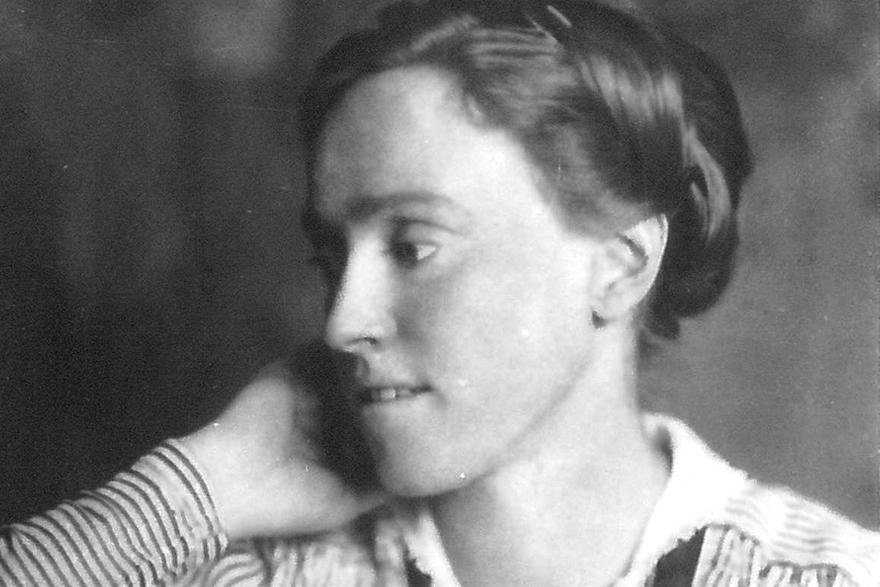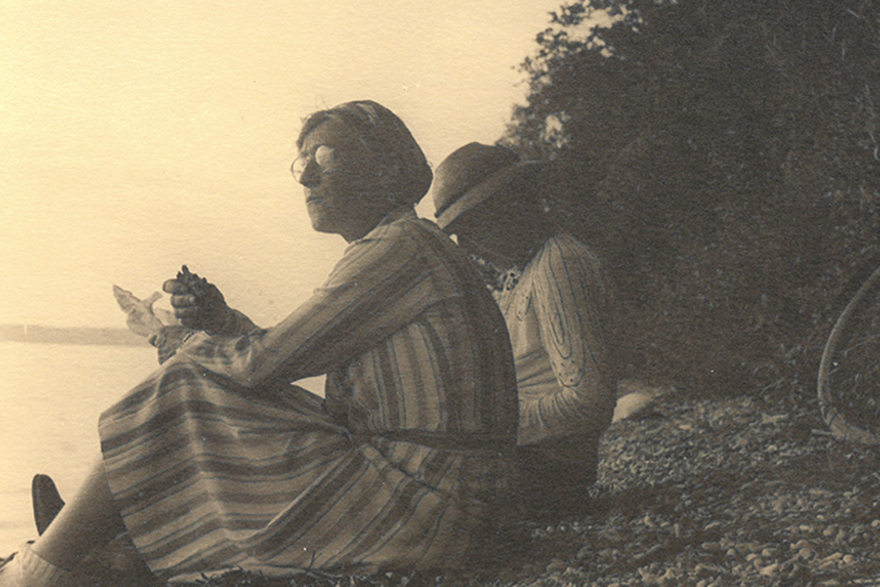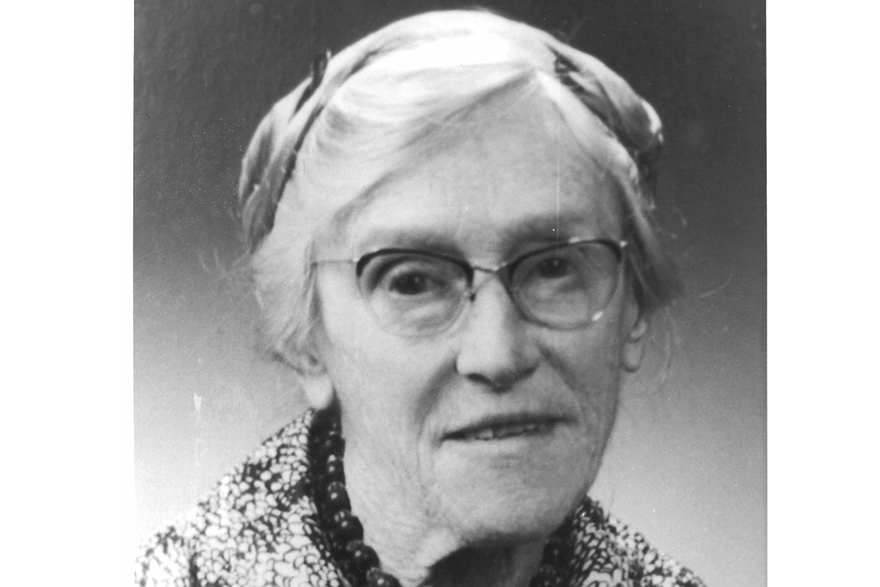The good spirit of Salem - On the 45th anniversary of the death of Marina Ewald
Marina Ewald (* December 14, 1887 in Berlin - † September 14, 1976 in Salem) came from an extremely cultured family. She was the daughter of the internist Prof. Dr. med. Anton Ewald (1845-1915), head of the Department of Internal Medicine at the Kaiserin-Augusta-Hospital in Berlin, and his wife Martha Ewald, born Kindermann (1852-1947). Her father often had Marina Ewald excused from teaching and taught her himself; her mother was considered a fine lady - she later lived in Salem as "Frau Geheimrat Ewald" until her death. Martin Kölling describes Ewald's environment as an "educated, cosmopolitan, upper-class Wannsee cosmos". She had already met Kurt Hahn as a schoolgirl in Berlin, because her brother was his classmate. With Kurt Hahn, she was already planning the founding of a new school according to her own concept as a student. With her school-leaving certificate from the Sophiengymnasium in Berlin, which she obtained in 1908, she was one of the first German school-leavers. She studied from the winter semester 1908/09 as one of the first female students in Berlin, 1909/10 in St. Andrewʽs in Scotland and as an exchange scholar 1912/13 in Bryn Mawr College in Philadelphia. In 1913 she passed the state examination in geography, chemistry and biology. After a brief stint as a teacher at the Land Education Home for Girls in Trebschen, she served as a scientific officer on the War Committee on Oils and Fats during World War I. She was a member of the German government. In 1918/19 she worked at the Odenwald School.
Co-founder of Salem
Kurt Hahn had already suggested to her during the war that she found the school she had planned in Lina Richter's house near Berlin. However, when she received an offer from Hahn in September 1919 to become a pedagogical assistant in the founding of Schule Schloss Salem, the senior teacher immediately accepted. She thus became the fourth founding personality of the school, along with Prince Max von Baden, Kurt Hahn and Karl Reinhardt. She was poached from the Odenwald School, among others, to make use of her experience in coeducation. According to Kölling, however, Hahn did not want the female emancipation practiced by Ewald for Salem. Jocelin-Young judges, however, that one of her main contributions was that Salem was a mixed school for boys and girls from the beginning. As Hahn's "right hand" and a "central figure" in Salem (Peter Friese) or "Hahn's smartest and wisest employee" (Golo Mann), she was entrusted with fundraising and management tasks, especially in the beginning. In the beginning, she also took care of milking the school's own cow and caring for the sick children. She also acted as a teacher and educator in the classroom, read aloud during recumbent time, and assigned the children to sports, farm work, guilds, and craft training. The introduction of the guilds and their expansion was due to her initiative. She also worked for Salem sports as a pillar of the women's field hockey team for many years. The pressures were so heavy that Ewald wanted to leave the school in the middle of 1922. Since without her the whole project was on the verge of collapse, Hahn was able to persuade her to stay. In 1922/23, in view of the school's material plight, she traveled for the first time to England and the United States to raise - successfully - vital funds for the school. Katja Mann wanted to enroll her son Klaus in Salem at this time. However, she had to leave again without having achieved anything, because Kurt Hahn could not make a decision without Marina Ewald - according to Golo Mann in his memoirs. In 1924 she accompanied a group of boys and girls to Italy for the first time. In 1925 she led 20 Salem boys on a four-week expedition to Finland - one of the basic experiences of Kurt Hahn's experiential therapy Outword-Bound. In 1925, together with Kurt Hahn and Lina Richter, she was one of the founders of the Förderverein Association of Schule Schloss Salem e. V. 1927 she traveled to England with an all-girls group.
" Fräulein Ewald "
In May 1929, she took over the management of the Salem branch school (Realgymnasium) at Schloss Spetzgart - the high point of her activities for the school according to Jocelin-Young. The location was chosen in particular because of its proximity to Lake Constance, which she wanted to include in her education. When she had explored Hohenfels Castle on an excursion, Kurt Hahn convinced her that this was the ideal junior school - it opened in 1931. In mid-1933, she had to relinquish the leadership of Spetzgart because she was "suspended" by the commissar appointed by the National Socialists, Prof. Adolf Müller: She had said that Hitler would lead a gang of murderers. In addition, Müller's goal was to replace the female teachers with male ones and to end coeducation. Since Ministerialrat Herbert Kraft considered Ewald's remarks to be mere "improprieties," Blendinger succeeded in 1934 in appointing her as head of the Spetzgart girls' mentorate from Easter to July. But once again she was found "unacceptable" by the authorities. She then lived in Salem without a position, but in 1937 led a group of boys and girls to Iceland. She was subsequently suspended for good. In cooperation with the forestry office housed in the castle, she compiled a list of locations of rare flowers and photographed them. She also visited Kurt Hahn in Gordonstoun every year in 1934-1938. "Fräulein Ewald" - as she was called until the end - according to Hanne Bauer always felt motherly pride over her students. After the war, she sadly judged, "I lost so many sons in the war that you could fill all the seats in the Salem dining room with them."
The good spirit of the school
In November 1945, "in the hour of women" (Ilse Miscoll), she was one of the essential re-founders of Schule Schloss Salem. Klaus Schultze reports in his Salem memoirs that Ewald was the real mentor of the school or the soul and symbol of Salem education: "She never seemed to grow old, walked through the corridors with wide-ranging steps and showed understanding for everyone. Even in the first post-war years, she seemed to have lost nothing of her youthful freshness." Christoph Graf von Schwerin, who joined the school shortly after the war, described her on his arrival at the boarding school in 1948 as follows: "A mildly smiling friendly old lady, of small stature, with an athletically trained body and eyes that always looked enthusiastic, I introduced her to the peculiarities of the Salem educational system. She was the last educator of this famous school who still understood the interrelationships of this system." In 1947, she participated in the founding of the Association of German Rural Educational Homes at the Odenwald School, and subsequently served on its working committee. She led Salem until 1948: "With her tireless energy and rich experience, she led the school for three years through all difficulties and hardships to new prosperity." (Werner Köppen). According to Peter Friese, she succeeded in reviving the Salem traditions, but she was overburdened with the sole management of the school. She subsequently worked again as a teacher and mentor. In 1949 she briefly took over the management of the Salem branch school Kirchberg, and in the Easter term of 1955 she was interim head of Spetzgart. In 1952 she served as department head of the Conference of Internationally-minded Schools (CIS). In 1964 she was one of the initiators of the Salem Social Service, and in 1972 she was probably - according to Ilse Miscoll - the "unnamed donor" who helped the school out of a financial crisis. No wonder that Golo Mann called her the "good spirit" of the school, even when she lived in seclusion as an "ancient lady" in two rooms of the castle - she led a life for Salem for 56 years of her existence.
The zis founder
At the instigation of Prince Georg Wilhelm of Hanover, the principal of Salem, Ewald met with Jean Walter in 1955. The latter had founded the Zellidja Foundation to award travel scholarships. Marina Ewald transferred the concept to Salem. With persistence and charm, she solicited idealistic and financial supporters for the travel scholarships. As early as 1956, the first scholarship holders went on a journey - initially financed by Marina Ewald herself. In 1966, on the occasion of the tenth anniversary of the scholarship program, the French Ministry of Education made her a Chevalier dans L'Ordre des Palmes Académiques, the highest award given to foreigners for services to French culture. "How much is owed to Marina Ewald over the past decade," Jocelin-Young said, considering her dedication to travel grants, "will never be calculated." She lived at Salem Castle after her retirement until her death and continued to oversee the scholarship program. For this she recruited Hanne Bauer and Liane Wuttig, who later worked for her. Ewald was still involved in the establishment of the zis Foundation for Study Trips, which was founded in the year of her death.
Honoring memory
On June 5, 1987, on the occasion of her 100th birthday, a "Marina Ewald Linden Tree" was planted on the Spetzgart as part of a "Marina Ewald Celebration". Her contribution to the self-determined travel used by more than 2,000 scholarship holders since then is commemorated by the Marina Ewald Award of the zis, also donated by Altsalemern in 1987. In 2018, the zis also published Marina Ewald's memoirs (edited by Rainer Linke, 138 pages) in German and French, which are kept in the Kurt Hahn Archive.


